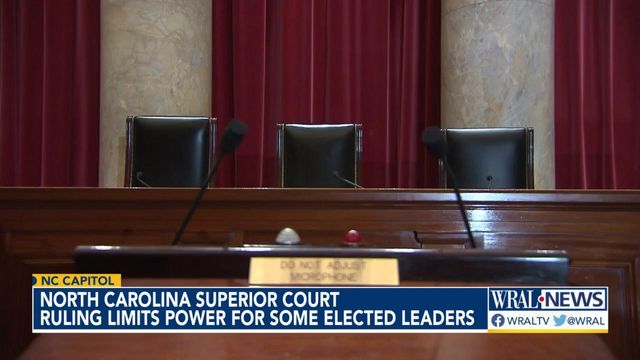NC Supreme Court says lawmakers voted into office through gerrymandered districts may have limited authority in amending state constitution
The North Carolina Supreme Court on Friday decided to send a case back to a lower court to consider further to what extent state lawmakers who were voted into office as a result of unlawful voting maps should be able to initiate a process to amend the state's constitution.
Posted — UpdatedAccording to the majority opinion, written by Associate Justice Anita Earls, lawmakers who won their seats through unconstitutional racial gerrymandering cannot then submit constitutional amendments that would permanently disadvantage the same groups discriminated against in the racial gerrymandering process.
“The record is clear that votes of legislators from unconstitutionally gerrymandered districts could have been decisive,” Earls wrote, referring to a pair of measures voters passed related to photo ID and income tax caps.
Republican House Speaker Tim Moore, who is named in the lawsuit, said he plans to appeal the ruling to the U.S. Supreme Court and hopes they will take it up.
“This is nothing more than just a purely political hack job, and I have never been more disappointed in any group and any elected officials as I am today in what these Democrats did on the state Supreme Court,” Moore said in an interview. “I’m certainly looking into taking this before the U.S. Supreme Court.”
In November 2018, North Carolina voters overwhelmingly supported a pair of constitutional amendments to require photo ID at the polls and reduce the maximum personal and corporate income tax in the state from 10% to 7%.
A bill to implement the photo ID requirements was rejected by Democratic Gov. Roy Cooper, but his veto was overridden.
The North Carolina NAACP successfully fought back against the constitutional amendments in Wake County Superior Court, arguing that the amendments couldn’t be implemented because lawmakers who put them on the ballot and enacted them were unfairly elected through gerrymandered voting maps.
An appeals court then sided with Republicans, allowing the photo ID and income caps to be implemented. Photo ID wasn’t required in the 2020 election, nor was it required in this year’s elections.
The state Supreme Court on Friday reversed the appeals court’s ruling and sent the case back to Wake County Superior Court for further consideration.
In a 4-3 ruling, the high court’s Democratic majority advised the lower court to consider three factors when reviewing the case again, including where there is a substantial risk that the challenged amendment would “immunize legislators from democratic accountability, perpetuate the ongoing exclusion of a category of voters from the political process or intentionally discriminate against a particular category of citizens were also racially discriminated against in the political process leading to the legislators’ election.”
If any of the three conditions are met, the Supreme Court said the lower court must invalidate the challenged amendments.
Andrew Taylor, a political science professor at N.C. State University who focuses on voting and elections, said the state Supreme Court’s ruling on Friday is unlikely to impact future constitutional amendments because the latest state legislative boundaries were settled after a court signed off on state House and state Senate maps that lawmakers redrew in February.
Prior to the 2018 election, lawmakers drew maps after looking at racial data. This year, lawmakers didn’t, making it more difficult to prove intent to discriminate based on race.
Taylor said the high court’s ruling on Friday could prove impactful if North Carolina judges apply the same ideas articulated in the decision to partisan gerrymandering, which is far less defined and settled.
"They have opened up a Pandora's box here,” Taylor said. “The question going forward is if courts want to start playing this game. The racial thing is done. I don't believe we're going to see many more challenges on racial grounds to redistricting. … The real key is with regard to partisanship. Would a court want to extrapolate from this ruling with regard to an unconstitutionally racially gerrymandered plan and say the same logic works with regard to a partisan one?”
The high court’s three conservative justices disagreed, noting that the court’s decision flies in the face of the will voters expressed in the 2018 election when they chose to support the changes to the state constitution.
“The sober people of this state will be left to wonder why, if they amended the constitution, those provisions are not in effect,” Associate Justice Phil Berger Jr. wrote in dissent. The negative fallout of today’s decision will be felt most by the people of this state and the confidence they have in this institution. Sadly, they will experience the chaos and confusion courts seek to avoid.”
GOP lawmakers also expressed disappointment with the state Supreme Court’s decision.
"Four Democratic justices have all but thrown out the legitimate votes of millions of North Carolinians in a brazen, partisan attempt to remove the voter ID requirement from our Constitution and deny the people the ability to amend their own Constitution,” Republican state Sen. Paul Newton said in a statement. “This is a direct attack on our democratic form of government from the most activist court in the state's history."
Voting rights groups have argued photo ID requirements would disenfranchise many Black voters.
“Rigging elections by trampling on the rights of Black voters has consequences,” NC NAACP President Deborah Maxwell said in a statement. “No legislature has the right to use racially gerrymandered maps—infecting more than two-thirds of the districts of this state—to steal power from the people to change our state’s constitution.”
• Credits
Copyright 2024 by Capitol Broadcasting Company. All rights reserved. This material may not be published, broadcast, rewritten or redistributed.





